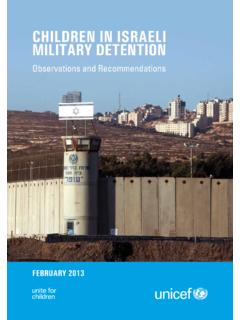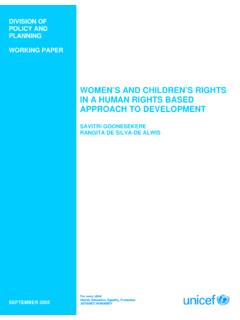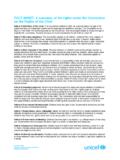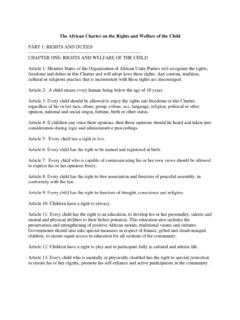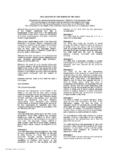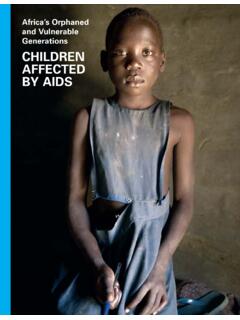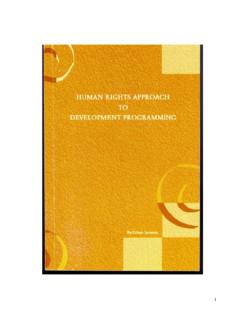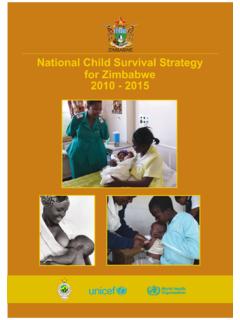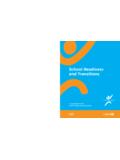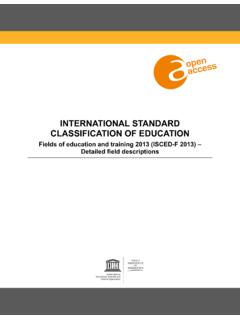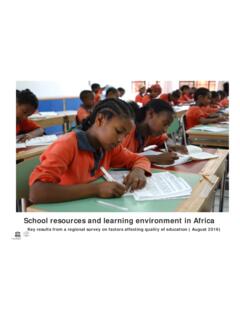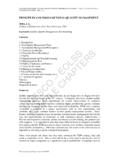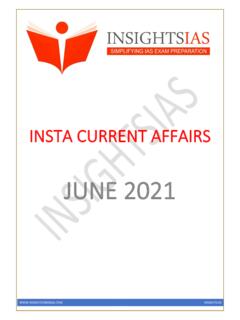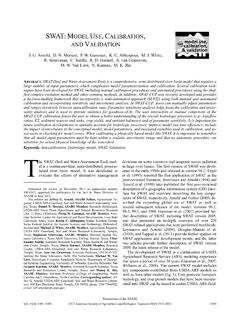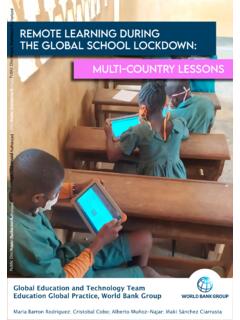Transcription of TRANSFORMING EDUCATION IN AFRICA
1 TRANSFORMING EDUCATION IN AFRICA . An evidence-based overview and recommendations for long-term improvements UNIC EF/ UN0 4 8 93 0 9/ D EJONGH. A Report by UNICEF and the African Union Commission 1 2 3 4 5. Foreword This report is the result of a successful collaboration safe, healthy and inclusive schools, greater use of digital between UNICEF and the African Union Commission. technologies, and teachers who are well trained to bring The report intends to contribute to the facilitation of these technologies to life to help children learn. high-level policy discussions between national EDUCATION authorities, regional and continental bodies on possible With such a young population (3 out of 5 Africans strategic shifts and interventions to boost access to are under 25 years old), it is now time for African EDUCATION and improve the quality of teaching and governments to boost their investment in EDUCATION in learning in AFRICA .
2 The report provides evidence-based order not to miss the current window of opportunity. analysis of the situation of EDUCATION in AFRICA while Harnessing the continent's demographic dividend and putting into perspective the Sustainable Development investing in human capital can deliver huge impact and Goals and the objectives of the Continental EDUCATION results in and for AFRICA . Strategy for AFRICA (CESA 16 25) in line with the African Union Agenda 2063. It highlights the progress made in UNICEF and the African Union Commission hope that the continent's EDUCATION sector over the past decade all African governments can act now to improve their (2010 2020) while pointing out the challenges that EDUCATION systems by allocating funds more fairly and remain, particularly in the area of equity. efficiently despite the additional fiscal pressure that the COVID-19 pandemic has created.
3 Eliue Kipchoge, the This report comes at a time when the global context Kenyan Marathon world record holder, once said, The (health, EDUCATION , financial systems) is severely best time to plant a tree was 25 years ago. The second- challenged by the COVID-19 pandemic, from which AFRICA best time to plant a tree is today.. is not exempted. While much of the data presented in the report predates the pandemic, it also describes how UNICEF and the African Union Commission appeal to some African countries have responded to the COVID- all African governments to seize the opportunity and 19 crisis in innovative ways, such as by offering distance renew their commitments to enhance the governance EDUCATION to children, combining high-tech and low-cost and efficiency of EDUCATION services through digital solutions to ensure the safe continuity of learning while transformation, reimagining EDUCATION systems schools were closed.
4 The pandemic can be seen as an and skills acquisition to meet the needs of a growing opportunity to reimagine EDUCATION in AFRICA , including digital economy. Robert Jenkins, Prof. Sarah Anyang Agbor, Global Director, EDUCATION Commissioner for EDUCATION , Science, UNICEF Technology and Innovation African Union Commission 1 TR ANSFORMING EDUCATION IN AFRICA : A N E V IDENCE-BASED OV ER V IE W A ND RECOMMENDAT IONS F OR LONG-T ERM IMPROV EMEN T S. 1 2 3 4 5. Acknowledgements This report was jointly prepared by the AFRICA Union Regional EDUCATION Advisor, West and Central Commission (AUC) and the United Nations Children's AFRICA Regional Office), Jephthe Mve Mvondo Fund (UNICEF) under the leadership of Robert Jenkins, (Policy & Advocacy Specialist, UNICEF Office Global Director EDUCATION at UNICEF Headquarters. to the African Union & ECA), Suguru Mizunoya (Senior Advisor statistics and Monitoring, UNICEF.
5 The team that prepared the current report was led by Headquarters), Haogen Yao ( EDUCATION Specialist, Nicolas Reuge (Senior EDUCATION Advisor, UNICEF) and UNICEF Headquarters), Margaret Kelly ( statistics consisted of: and Monitoring Specialist, UNICEF Headquarters), Sakshi Mishra (MICS-EAGLE Regional Reports Writing n AUC: Lukman Olawale Jaji (Policy Officer); Nicholas Consultant, UNICEF Headquarters), Yixin Wang Ouma (Senior Youth Advisor); Adoumtar Noubatour ( EDUCATION Data and statistics Consultant, UNICEF. (IPED Coordinator); Hambani Masheleni ( Head Headquarters), Karen Avanesyan (Data and statistics of EDUCATION Division) Specialist, UNICEF Headquarters), and Emily Dawson (Intern, UNICEF Headquarters). n UNICEF: Noguebzanga Jean Luc Yameogo ( EDUCATION Specialist, Headquarters); Achila Imchen (Public Partnerships Division, Headquarters); Notes on the data used in this report Alassane Ouedraogo ( EDUCATION Specialist, MENA.
6 Regional Office); Beifith Kouak Tiyab ( EDUCATION The report relies primarily on the most recent data from Specialist, ESA Regional Office); Yacouba Djibo the unesco institute for statistics (UIS) and household Abdou ( EDUCATION Specialist, WCA Regional Office), surveys such as the Multiple Indicator Cluster Surveys Erin Euiryeong Jeong (consultant). (MICS) and Demographic Health Surveys (DHS). The report is based on robust statistical analysis, with The preparation of this report also benefited from additional calculations being made by the authors to substantial inputs from: Abhiyan Jung Rana (UNICEF illustrate the progress and challenges of EDUCATION in Regional EDUCATION Advisor, Eastern and Southern AFRICA . Continental and Regional Economic Communities AFRICA Regional Office), Brenda Haiplik (UNICEF (REC) averages are calculated if at least one third of the Regional EDUCATION Advisor, Middle East and North countries belonging to those geographic entities have AFRICA Regional Office), Cecilia Baldeh (UNICEF data for the specific period of interest for the study.
7 U N I C E F / U N I 2 3 6 10 1/ N O O R A N I. 2 TR ANSFORMING EDUCATION IN AFRICA : A N E V IDENCE-BASED OV ER V IE W A ND RECOMMENDAT IONS F OR LONG-T ERM IMPROV EMEN T S. 1 2 3 4 5. Acronyms and abbreviations AUC African Union Commission CBC Competency Based Curriculum CESA Continental EDUCATION Strategy for AFRICA CONFEMEN Conference of the Ministers of EDUCATION of French-speaking countries COVID-19 Coronavirus disease, first identified in 2019. DHS Demographic and Health Surveys ECE Early Childhood EDUCATION EMIS EDUCATION Management Information System FCUBE Free Compulsory Universal Basic EDUCATION GDP Gross Domestic Product ICT Information and Communications Technology IMF International Monetary Fund IIEP- unesco International institute for Educational Planning of unesco . IPED Pan-African institute of EDUCATION for Development KICD Kenya institute of Curriculum Development MENA Middle East and North AFRICA MENARO UNICEF Middle East and North AFRICA Regional Office MICS Multiple Indicator Cluster Surveys MHM Menstrual Hygiene Management MOOC Massive Open Online Course MSL Multisensory Structured Language PASEC CONFEMEN Programme for the Analysis of EDUCATION Systems PPP Purchasing Power Parity REC Regional Economic Communities SDG Sustainable Development Goals TVET Technical and Vocational EDUCATION and Training unesco United Nations EDUCATION , Scientific and Cultural Organization UNICEF United Nations Children's Fund UIS unesco institute for statistics WASH Water, Sanitation and Hygiene WEF World Economic Forum 3 TR ANSFORMING EDUCATION IN AFRICA : A N E V IDENCE-BASED OV ER V IE W A ND RECOMMENDAT IONS F OR LONG-T ERM IMPROV EMEN T S.
8 1 2 3 4 5. Click on section buttons or any text below to navigate publication CONTENTS.. 1 EQUITY ANALYSIS: MANY CHILDREN. REMAIN EXCLUDED FROM .. 30. Acknowledgements.. 2. Disparities in EDUCATION between boys and Acronyms and .. 3 girls, rich and poor, urban and 30. Structural inequities: children from wealthy families benefit more from EDUCATION 31. INTRODUCTION.. 6. Evidence and Practical 6 LESSONS LEARNT FROM THE EDUCATION . EDUCATION in AFRICA : Recent Progress, but RESPONSE TO COVID-19 AND OTHER. Disparities 6.. 34. EDUCATION and COVID-19: Exacerbating the Unpreparedness of EDUCATION systems for Learning 7. the digital learning era .. 35. Responses to 8. Addressing the digital divide in 35. The benefits of boosting investment THE STATUS OF EDUCATION IN AFRICA .. 9 in WASH in schools, and considering A young and fast-growing 9 reductions in class 36. High levels of adult illiteracy hindering the Exploring alternative pathways to deliver schooling of 10 remote learning solutions.
9 37. AFRICA has made substantial progress in getting children into 11 DATA GAPS: THE NEED FOR ENHANCING. Despite progress, the proportion of out-of- EDUCATION DATA SYSTEMS, GIVEN. school children remains 12 EMERGING DATA NEEDS.. 40. School completion remains a key 13. Limited access to and participation in WAY FORWARD: RECOMMENDATIONS FOR. technical and vocational EDUCATION and 15 TRANSFORMING AFRICAN EDUCATION . Learning outcomes a cause for 17 SYSTEMS IN A POST-COVID .. 42. AFRICA will need 17 million teachers to achieve universal primary and secondary EDUCATION by 18 REFERENCES.. 46. Public funding of EDUCATION : now is the time to 21 .. 49. Bottlenecks and barriers to improving 27. LIST OF TABLES. TABLE : Literacy rate and rural population in TABLE : Pupil teacher ratio, pupil qualified AFRICA , by region.. 11 teacher ratio and percentage of qualified teachers in AFRICA , by region, 2019 or nearest.
10 19. TABLE : Share of out-of-school children by age group and by region in AFRICA , .. 13 TABLE : Share of EDUCATION in government expenditure and government spending as %. TABLE : Completion rates in AFRICA , 2019 or 15. of GDP, 2018 or nearest.. 24. TABLE : Completion rates by gender, location and wealth quintile in AFRICA , 2019 or .. 31. 4 TR ANSFORMING EDUCATION IN AFRICA : A N E V IDENCE-BASED OV ER V IE W A ND RECOMMENDAT IONS F OR LONG-T ERM IMPROV EMEN T S. 1 2 3 4 5. Click on section buttons or any text below to navigate publication LIST OF FIGURES. FIGURE : Composition and evolution of the FIGURE : Share of teacher deployment in African population (in millions).. 9 schools not explained by the number of students, 2015 or nearest.. 21. FIGURE : AFRICA 's share of the world's population aged 3 to 24, 2000 to 2030.. 10 FIGURE : Government expenditure on EDUCATION as % of GDP in AFRICA , 2018.
